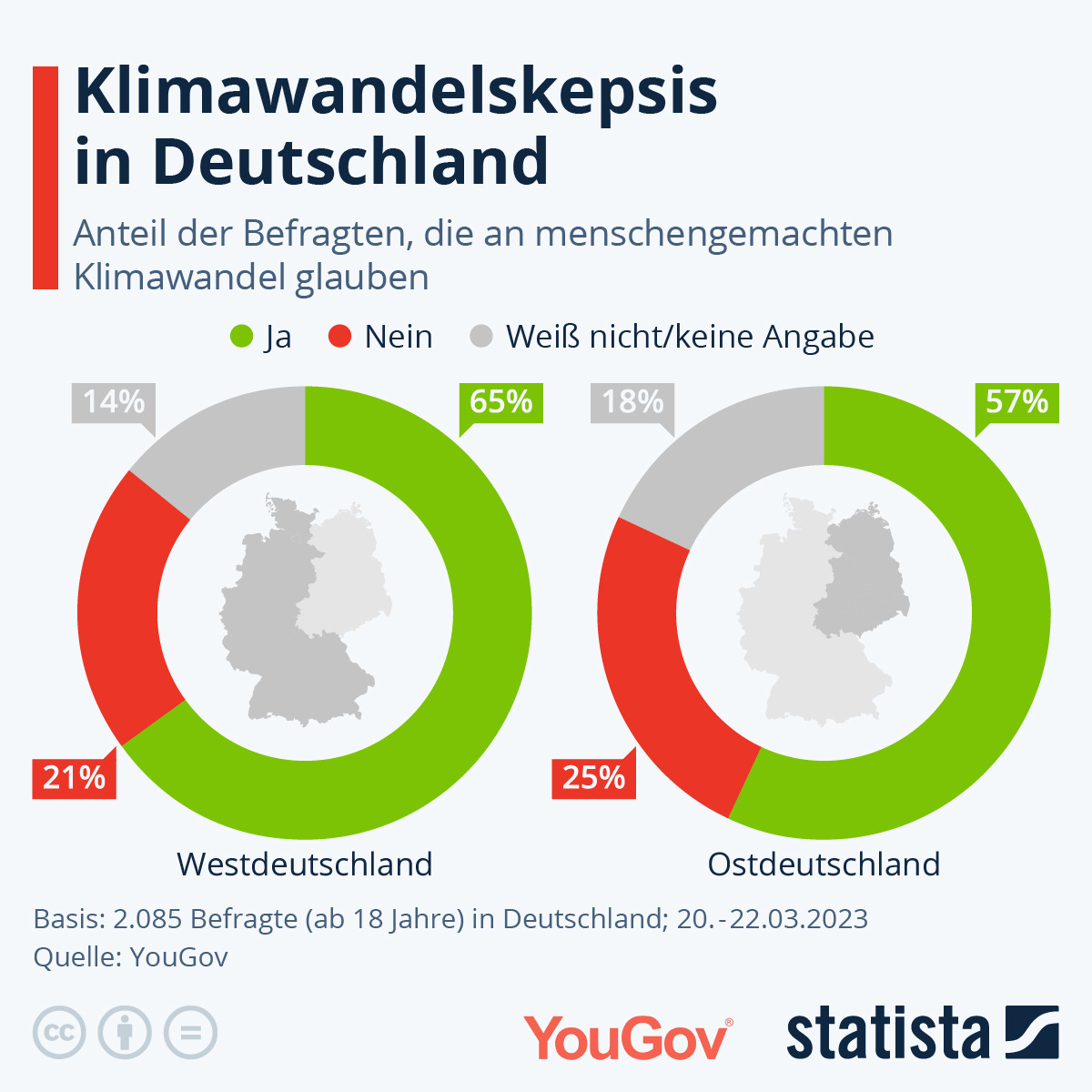Is the climate challenge a threat to democracy?
#7
'When it comes to climate justice, democracy knows no borders.' — Greta Thunberg
Dear Friends of Democracy,
I didn‘t think we would discuss this question again. The question of men made climate change.
But we have to.
The question is back again, at least in my home country. More than 20 per cent of the German people do not think global warming is the primary result of people‘s actions (see chart👇, only in German).
It is about the same share voting for the AfD, a far-right, partly extremist party here in Germany that is currently on the rise (see also chart 👇, only in German).
The similar numbers are no coincidence.
The AfD denies men made climate change. No wonder. You can score votes with climate denial since the cost of CO2 avoidance is beginning to impact people‘s everyday lives financially. Consequently, the AfD promises to stop climate action and that people can carry on with their lives as before. The problem with this: If we leave everything as it is, a lot will turn for the worse.
So, what to do? How can climate protection succeed without endangering democracy?
Four things are crucial.
The first point is self-evident: The measures adopted must be effective. That means CO2 emissions must actually fall. In the best-case scenario, the reduction happens at the lowest possible costs. The lower the costs and the better the results, the more support for climate policy.
Second, if the government charges people to incentivise low-carbon behaviour, it should return the revenue to the people; in other words, climate policy must not be a money-printing machine for the state. This would undermine the credibility of climate policy.
Third, national climate policy needs international connectivity. In fact, the measures of one country are of little use if others do not participate. States must, therefore, form alliances for climate policy.
Fourth, we need faith in scientific institutions. The tangible connection between one‘s own actions and global warming is incomprehensible. We, therefore, have to tend to believe what scientists find out. If we don‘t, we are more prone to believe in fake news.
If this is the state of the challenge what has to be done?
First, an effective climate protection policy starts where CO2 is emitted, with the oil and coal that is burned. There is no need for regulations about which products we are allowed to buy or how we should insulate our houses if we monitor and constantly reduce CO2 emissions at the point of occurence. The good news, we have already invented the instrument of doing so; it is the instrument of CO2-emissions certificate trading. And since those certificates can be traded, it also has the advantage that CO2 is saved where it hurts the least (I‘ve written about that trading system here).
Second. Along with the emissions trading system, the state generates income (you must buy certificates to emit CO2), which can be distributed back to the people. More people will likely accept a climate policy that gives money (back) to the people.
Third. We urgently need to set up a global climate club. States that work on common climate goals must be rewarded; the others must suffer from not following the CO2-reduction path. This is the only way we can stop climate-free-riding behaviour that created the climate problem in the first place (I’ve wrote more about it here).
The fourth measure is the most challenging: We have to create the conditions that more people can believe in the results of independent science. Even if these results are counter-intuitive and against one‘s interest in the short run. What are the fundamental prerequisites? To believe in science, we need basic trust in people because most of the results can‘t be proven by a single person. But we do not only need to trust people in general but also institutions such as universities. We believe these institutions most when they work transparently and are as uninteneded as possible. By this, I mean that interest groups should not be able to influence these institutions. Science should only have one purpose: gaining knowledge. So, we need independent research. And we need to expose as many people as possible to this independent research. Experience creates understanding. Therefore, we need more people to get to know the scientific world. Maybe the knowledge of how science works shouldn't be reserved only for those who attend universities.
The upshot: The fight for climate protection is a challenge for democracy. But we don't have to worry. We can overcome the challenge. There are solutions. We just have to look for it with an open mind. And we have to give everyone the prerequisites to take part in this search for answers and to be able to understand and to believe in the results.
See you,
Johannes Eber



